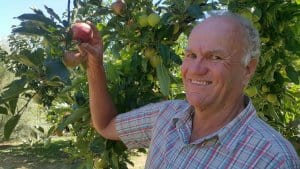A self-confessed tree hugger, Gordon Reid is a driving force in educating workers who are helping underpin growth in the region’s flourishing fruit growing sector.
The Hawke’s Bay Fruitgrowers’ Association recently saluted the achievements of the EIT lecturer in horticulture, awarding Gordon the Joe Bell Trophy for service to the industry.
The prestigious award commemorates the late Joe Bell, who worked in Hawke’s Bay for the Ministry of Agriculture and Fisheries and the New Zealand Apple and Pear Board. Association president Lesley Wilson says this year’s award-winner epitomises the tireless work ethic associated with Joe Bell.
Growing up on his parent’s orchard in York Road on the outskirts of Hastings, Gordon feels the land is in his blood. But as the youngest of four children, he didn’t anticipate a future working in the family business.
Leaving school, he studied geography, progressing to a master’s degree majoring in physical geography. Then, after teaching at a local high school for 16 years, he turned his hand to growing asparagus and tomatoes commercially for 12 years.
The 2003 move to EIT was a natural evolution, he says, combining his passions for horticulture, the soil and for seeing his students succeed.
“I love the teaching side of things,” he enthuses, “seeing the light bulb moments is so rewarding.”
Gordon coordinates the three-year programme for the level four National Certificate in Horticulture Production (Fruit Production). Trainees are employed on orchards and in vineyards and attend EIT 12 to 14 days a year for block course study.
Regularly meeting the trainees’ grower-mentors at their workplaces, Gordon’s range continues to widen. A record 75 trainees enrolled at EIT last year compared with the 20 students he taught when he started in the job.
This year, student numbers are expected to reach around 85, a measure of the strength of Hawke’s Bay’s fruit growing sector. The area in apple orchard increased 20 percent over the last two years and, as recently planted trees come into production, it will boost demand for permanent, well-trained workers.
Gordon says the training scheme is a three-way success story for EIT, participating grower-trainers and full-time orchard and vineyard workers. And it is one of many factors underpinning the region’s dynamic fruit growing industry. New varieties, new markets, particularly in Asia, and the Recognised Seasonal Employer scheme operated through Immigration New Zealand since 2006 also contribute to its success.
Employing seasonal workers, mainly from Pacific nations, is ensuring picking and thinning occur at optimum times in the growing season, enhancing the quality of the fruit.
All this is in marked contrast with a period of decline in the industry. As Lesley Wilson points out, trainee numbers were low over 2004-2007 when growers were grappling with poor prices. “No formal training was being pushed by industry and the industry was in dire straits.”
Now, Gordon says, further industry qualifications are coming on stream at EIT.
“It’s an exciting time, with a new Level 5 Diploma in Horticulture giving graduates a pathway to go onto.”
Gordon believes the training offered in Hawke’s Bay provides a good model for other fruit growing areas and primary industries. A similar scheme is now being considered for EIT Tairāwhiti and fruit growers in the East Coast area.


